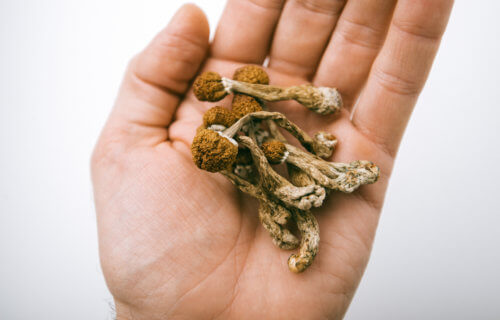LISBON, Portugal — Tripping on “magic mushrooms” makes music sound and “feel” better. That’s the conclusion of a new study examining psilocybin, the active hallucinogenic ingredient in mushrooms. Researchers say the drug can boost the experience by as much as 60 percent.
Scientists add pairing the psychedelic drug with music could be yet another way to use them as a depression treatment.
“We found that psilocybin markedly enhanced the emotional response to music, when compared to the response before taking the drugs,” says study lead author Professor Dea Siggaard Stenbaek of Copenhagen University, in a media release.
Researchers believe humans have been taking magic mushrooms, which contain psilocybin, for over 6,000 years. Psilocybin was first synthesized in 1958 by Swiss chemist Albert Hofmann, who discovered LSD. Extensive research into psilocybin’s medical uses began early on, however, this became difficult after the U.S. introduced a ban on the use of psychedelics in 1970.
Music’s long connection to mushrooms
Psychedelics, including psilocybin, became popular during the “Flower Power” movement of the 1960s and inspired a host of bands including, reportedly, The Beatles. Previous studies have confirmed LSD has a profound impact on the brain when people listen to music. Current entertainers have even been influenced by psychedelics, such as Harry Styles’ second album “Fine Line” which was inspired by magic mushrooms. Two years ago, Styles reported tripping and listening to the greats of the psychedelic era while spending time at Shangri-La Studios in Los Angeles.
“Ah, yes. Did a lot of mushrooms here. We’d do mushrooms, lie down on the grass, and listen to Paul McCartney’s ‘Ram’ in the sunshine,” according to Styles during a tour of the studio. “This is where I was standing when we were doing mushrooms and I bit off the tip of my tongue. So I was trying to sing with all this blood gushing out of my mouth. So many fond memories, this place.”
Can music and mushrooms improve emotional well-being?
To test the effect of psilocybin on music listeners, 20 men and women were given psilocybin or the controlled drug called ketanserin that treats high blood pressure. Afterwards, they listened to Elgar’s “Enigma Variations” and Mozart’s “Laudate Dominum” for a total of ten minutes. Scientists measured the participant’s enjoyment and then gave them a score using the Geneva Emotional Music Scale which covers nine mental states. They include wonder, transcendence, tenderness, nostalgia, peacefulness, power, joyful activation, tension, and sadness.
“Psilocybin increased the emotional response to music by around 60%. This response was even greater when compared to ketanserin. In fact, we found ketanserin lessens the emotional response to music. This shows [the] combination of psilocybin and music has a strong emotional effect. We believe this will be important for the therapeutic application of psychedelics if they are approved for clinical use. Psilocybin is under development as a drug to treat depression. This work implies music needs to be considered as a therapeutic part of the treatment,” Prof. Stenbaek reports.
Scientists randomly selected the drug to be administered first for each individual so they could report on the effects of both. At the peak of effects, they listened to the short music program and rated their feelings. Scientists generally use selected music playlists to support the psychedelic experience during clinical trials involving psilocybin. The findings suggest combining psilocybin with music will achieve the greatest benefits.
How does psilocybin impact the brain?
There has been considerable interest in the use of psychedelics in the treatment of depression and other mental illnesses. In particular, research has shown promising results with the use of psilocybin, which is found naturally in several species of mushrooms. The “trip” occurs quickly and is administered with psychological support. Scientists say psilocybin could yield even stronger therapeutic advantages given that it affects the way music elicits emotions.
“Interestingly, some of the music we used, Elgar’s famous ‘Nimrod’ variation, describes his close friend Augustus Jaeger. Jaeger encouraged Elgar to write the variations as a way out of depression. So we’re pleased to see it used again to help understand more about mental health. Our next step is to look at the effect of music on the brain while under the influence of psilocybin in data material we have already collected, using an MRI [magnetic resonance imaging] scan,” Prof. Stenbaek concludes.
Researchers believe psilocybin increases connections between brain neurons that are weakened in people with depression. Magic mushrooms were sometimes used in spiritual events held by indigenous Americans hundreds of years ago. Past studies on the drug’s ability to combat anxiety, depression, and alcoholism have shown promise.
“This is further evidence of the potential of using music to facilitate treatment efficacy with psychedelics. What we need to do now is optimize this approach probably through individualizing and personalizing music tracks in therapy,” says Professor David Nutt of Imperial College London, who did not take part in the study.
Researchers presented their findings at the European College of Neuropsychopharmacology’s 34th Congress in Lisbon.
South West News Service writer Mark Waghorn contributed to this report.

How interesting that psilocybin increases your emotional response to music so much. It is our anniversary this month and we love live music. We will find an excellent music event in the area for this.